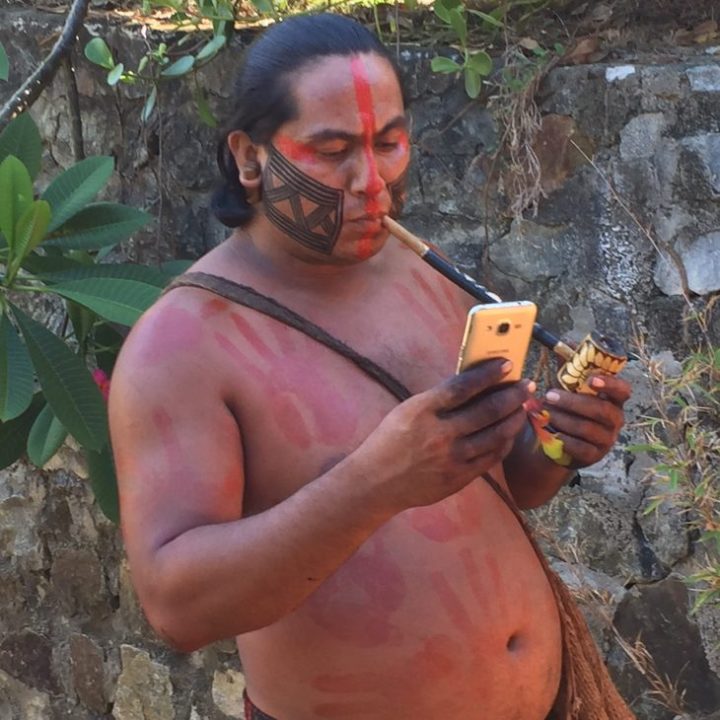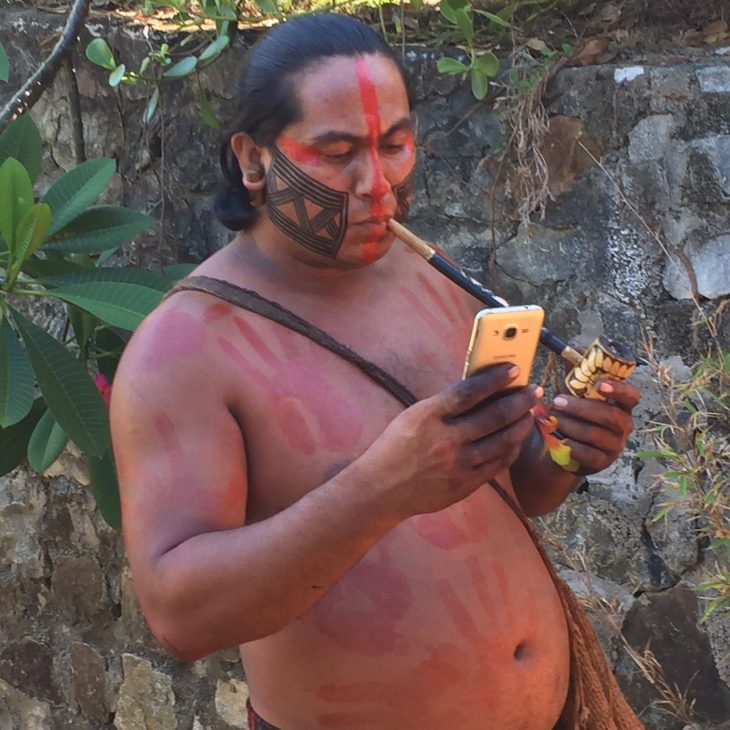We are in Imbassai in the state of Bahia. It’s lush, beautiful and green. I am escaping the London winter gloom. For Fixyá of the Fulni-ô tribe, covered in body paint, he is escaping a desertified region in Pernambuco state. He lives by a town called Aguas Bellas (Beautiful Water) which is ironic as there isn’t any. We are here for the Encontro Multietnico, organised by Juliano Basso, where representatives of several different Brazilian indigenous groups, nearly all from the Amazon, can ‘get together, exchange information, bond and have fun’. You certainly bond with people in a three-hour sweat lodge session, even if I wouldn’t call it fun exactly.
Tangara Mirim, where this jamboree took place was intended to be a stables – a retired millionaire built them as his dream project but promptly expired, and the horses never came. The enterprising Glaucia Rodrigues bought the place and is putting on events, like this one, followed by a global music festival.
When asked, I say I am from Stoke Newington in London: a white tribe stereotyped unfairly by outsiders for their beards, fixed-gear bicycles and complex mating rituals over flat-white coffees, surrounded by Hassidic and other tribes, who we more or less get on with.
One subject which kept recurring was the question of ingenious languages and their disappearance. There are many different languages in Brazil – around 200 in the Amazon, down from an estimated 1,000 or so at the time of the arrival of the Portuguese. While most of us tend to at least pay lip service to species being wiped out, there is less attention on languages becoming extinct. In Mark Abley’s fascinating book Spoken Here: Travels Among Threatened Languages, on current trends 50 to 90 per cent of the worlds 6,000 or so languages will disappear by the end of the century. He also mentions one Amazonian language which is only now spoken by a parrot.
Among the Amazonian languages, while branches of, say, Xingu might have the same differences as European languages, some neighbouring groups can be as different as French to Chinese. On the other hand, there are similarities between cultures – nearly all are pagan and shamanic and with certain exceptions their music is a stomping four to the floor, like techno. What gives a lot of variance is the mixtures. One Guarani group sang a beautiful Catholic song learnt from missionaries and the Fulni-ô did a cool ancient samba, but they are mixed with African elements, as opposed to the Asian origin of most of the Amazonian tribes. These days many indigenous people live in the city; one of Brazil’s top rappers MC Guarani hails from the Amazon.
Among the participants some were relatively happy with their lot – like the Kayapo who have a vast 11,000 hectare tract of land and are developing Brazil nut exports and handicrafts and are doing quite well. A photographic exhibition of the Guarani Kaiowá, on the other hand, showed battles with farmers and land disputes. Scores of Indians have been killed in the last year in such turf wars. Although their land is supposedly protected by the Brazilian constitution, demarcation of land can take decades to be officially recognised.
Should we care? We can perhaps take some chauvinistic pride than English has succeeded so wildly. But as one of the Guarani participants said, each time a language disappears it is like a library burning down. Their knowledge and use of Amazonian herbs has built up over centuries. ‘It’s not just that humanity will become impoverished,’ explained musicologist Magda Pucci, ‘we are destroying things we don’t understand.’
What is more of a wild card is social media. Already anthropologists like Pucci communicate with indigenous leaders primarily on Facebook and during the conference many of them were checking their status between sessions. That, as much as the soy bean farmers, may lead to a homogeneity of culture and a more boring world, with only the odd Amazonian parrot reminding us there are different ways of seeing the world.







Comments